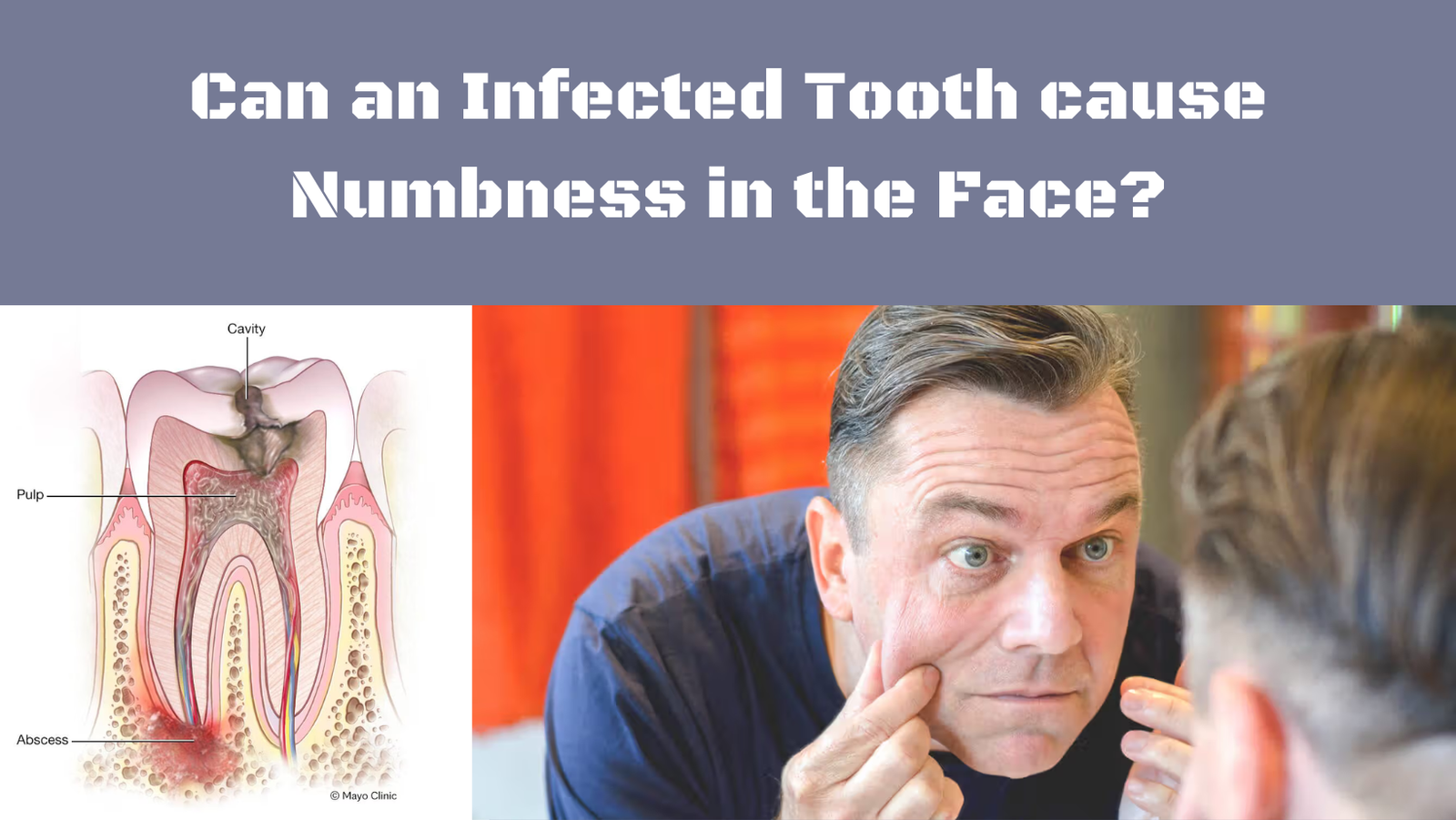Dental health is intricately linked to overall health, and sometimes, symptoms in seemingly unrelated areas of the body can trace their origins back to oral health issues. One such symptom is numbness in the face, which may be surprising to some as a potential consequence of an infected tooth.
This article explores the connection between tooth infections and facial numbness, the underlying mechanisms, diagnosis, treatment options, and preventative measures.
Understanding Tooth Infections
What is a Tooth Infection?
A tooth infection, often referred to as an abscessed tooth, develops when harmful bacteria penetrate the dental pulp—the core section of a tooth that houses nerves, blood vessels, and connective tissues. Such infections typically stem from neglected dental cavities, physical trauma to the tooth, or complications arising from past dental procedures.
Types of Tooth Infections
Tooth infections can manifest in various forms, each targeting different parts of the dental structure. A periapical abscess is typically found at the root tip of a tooth, directly affecting the area where the tooth anchors to the jaw. Conversely, a periodontal abscess forms along the side of the tooth root but within the gums, impacting the surrounding tissues more than the tooth itself.
Another type, known as a gingival abscess, is located solely in the gum tissue and does not involve the tooth or the supporting periodontal ligament, making it distinct from the other two types of infections.
Link Between Tooth Infections and Facial Numbness
How Can an Infected Tooth Cause Numbness?
Facial numbness related to tooth infections is primarily due to the spread of infection from the tooth to the facial nerves. The nerves most commonly affected are the trigeminal nerve, which is responsible for transmitting sensations from the face to the brain. If an infection spreads to areas surrounding this nerve, inflammation and pressure can lead to numbness.
Areas of the Face Affected
Numbness in the face is a common symptom that can manifest in various regions, depending on the underlying causes such as a tooth infection. Typically, this sensation of numbness might be felt in the lower jaw, the cheeks, the lips, or it can even spread to cover half of the face.
The extent and specific location of the numbness often correlate with the particular nerve branches that are affected by the infection.
Symptoms of a Tooth Infection Spreading
Experiencing a continuous ache in your teeth, accompanied by noticeable swelling in the facial or cheek area, can be quite distressing. This discomfort is often exacerbated by an increased sensitivity to temperature extremes, such as hot or cold substances. In some cases, these symptoms may be accompanied by a fever and swollen lymph nodes located beneath the jawline or around the neck area.
Additionally, if an abscess is present and bursts, you might experience an abrupt release of an unpleasant-tasting liquid, which, despite its foul nature, might bring a sudden alleviation of pain.
Diagnosis of Tooth-Related Facial Numbness
Dental Examination
A thorough dental assessment is essential for identifying potential oral health issues. This examination involves evaluating the sensitivity of the teeth, looking for any signs of swelling, and determining the severity of any gum infections present. Such evaluations help in ensuring the overall health and maintenance of one’s dental hygiene.
Imaging
When diagnosing infections related to dental issues, healthcare professionals often employ imaging techniques such as X-rays and computed tomography (CT) scans. These tools are essential for assessing the severity and spread of the infection, particularly in and around the tooth area. They also help in checking whether the infection has extended to the facial bones, providing crucial information that guides the treatment plan.
Treatment Options
Managing the Infection
Effective management of dental infections involves several treatment strategies depending on the severity and location of the infection. For initial control and eradication of the infection, antibiotics are prescribed. In cases where the infection has penetrated deep into the dental pulp, root canal therapy is performed to remove the infected material and securely seal the tooth to prevent further infection.
However, if the tooth is beyond repair due to extensive damage, extraction becomes necessary to prevent the spread of infection to surrounding tissues. These treatments are tailored to address the specific needs of the patient while aiming to preserve as much of the natural tooth structure as possible.
Treating Numbness
To address numbness, a range of treatments may be employed depending on its underlying cause. Typically, pain management and reducing inflammation are the initial steps, often involving the use of pain relievers and anti-inflammatory medications.
If the numbness continues even after any associated infections have been resolved, physical therapy might be suggested as a course of action to help alleviate the symptoms and restore normal sensation. This therapeutic approach focuses on exercises and techniques that can improve circulation and nerve function in the affected areas.
Preventative Measures
To maintain optimal oral health and avoid dental problems, it is essential to adopt several preventative strategies. Regular visits to the dentist for check-ups can help catch issues before they develop into more serious conditions. Practicing good oral hygiene is crucial; this includes brushing your teeth twice a day and flossing daily to remove plaque and prevent tooth decay.
Additionally, limiting your consumption of sugary foods and beverages can significantly reduce the risk of cavities. Addressing dental concerns promptly ensures they do not worsen, saving time and avoiding more extensive treatments in the future.
Check Similiar Guide: Can you use Frankincense Oil on your Face?
Conclusion
Facial numbness can occasionally stem from a dental infection, as the infection might extend to the nerves in the face. It is essential to identify early signs of a tooth infection spreading and to consult a dentist quickly to avoid such complications.
Maintaining diligent oral hygiene and seeking regular dental check-ups can greatly reduce the likelihood of experiencing severe issues from tooth infections. Being aware of how oral health impacts broader physical health is crucial for preserving one’s overall health.
Frequently asked Questions
Can an infected tooth cause numbness in my face?
Yes, an infected tooth can occasionally lead to numbness in the face. This occurs due to the spread of infection from the tooth to the surrounding nerves.
Which teeth are most likely to cause facial numbness when infected?
Infections in the lower molars are more likely to cause facial numbness because their roots are close to the nerve that controls sensation in the lower part of your face.
What specific dental condition could lead to facial numbness?
A dental abscess, which is a collection of pus due to infection in the tooth or gums, can lead to facial numbness if the infection spreads to nearby nerves.
How does an infection spread from a tooth to the face?
The infection can spread from the root of an infected tooth into the surrounding tissues and affect the nerves, leading to numbness in the face.
Is facial numbness a common symptom of tooth infection?
While it is not the most common symptom, facial numbness can occur, especially in severe cases of infection where there is considerable nerve involvement.
What should I do if I experience facial numbness from a tooth infection?
Facial numbness is a sign of a potentially serious infection. It is important to seek immediate dental or medical attention to address the infection and prevent further complications.
Can treating the infected tooth relieve the numbness in my face?
Yes, treating the infected tooth, typically through procedures like root canal treatment or extraction, can alleviate the numbness once the infection is controlled.
Are there any risks if facial numbness from a tooth infection is ignored?
Ignoring this condition can lead to the spread of infection to other parts of the face and skull, potentially resulting in more severe health issues.
Can children also experience facial numbness from tooth infections?
Yes, children can experience facial numbness due to tooth infections, though it is less common. Immediate pediatric dental consultation is advised if symptoms appear.
What other symptoms might accompany facial numbness due to a tooth infection?
Other symptoms can include severe toothache, swelling in the face or gums, fever, and a general feeling of unwellness.


